Sunday, September 28, 2008
Monday, September 22, 2008
Ghost Town

"Ghost Town" is one of those minor miracle films that one who pays enough attention to film release schedules and box office grosses is always surprised to see pop up. For one thing, it's three main actors are somewhat well known, but none of them are major money makers-one of them is very famous in the United Kingdom, but not exactly at the pinnacle of fame in America. And it also is opening on a very crowded weekend for movies, and in the middle of September which is commonly a dumping ground for studios as they get ready for their big award pushers. So it was no surprise to me when Dreamworks decided to slash their release for "Ghost Town" a whole thousand screens, but it was a surprise to me when the film actually turned out to be very very good-a somewhat conventional romantic comedy formula that is elevated by three terrific performances.
Thursday, September 18, 2008
Towelhead
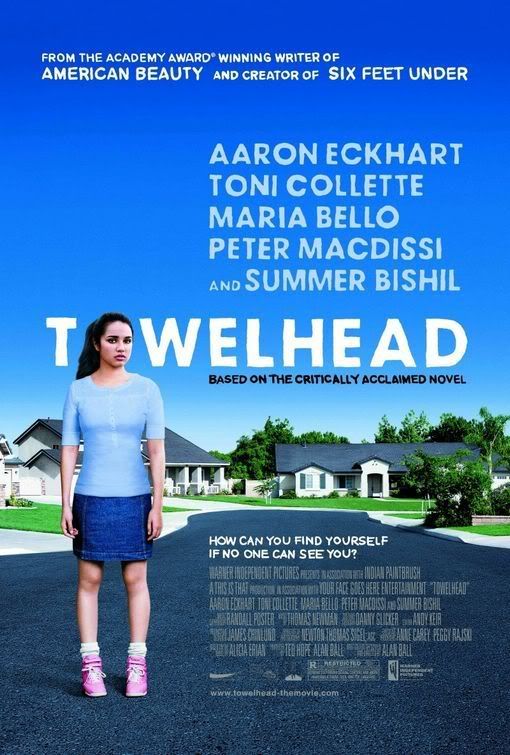
Alan Ball is one of those writers whom when mentioned one either shakes their head in disgust at his work, or finds him to be a complete genius. And then of course there are those that have no idea who he is, but those need not be mentioned. Simply put, they don't know what they're missing. Hopefully you know what a daring, lurid, and interesting writer Alan Ball is. He blew me away with his writing debut in 1999 with "American Beauty," and I really enjoyed his television show "Six Feet Under" earlier in the decade. Of course when I learned that he was not only writing a new film, but also making his directing debut, my interest was at its peak. And of course when this film was premiering at the 2007 Toronto Film Festival, which I was in attendance, I wanted to do everything that I could to get a ticket for it.
Sunday, September 14, 2008
Burn After Reading
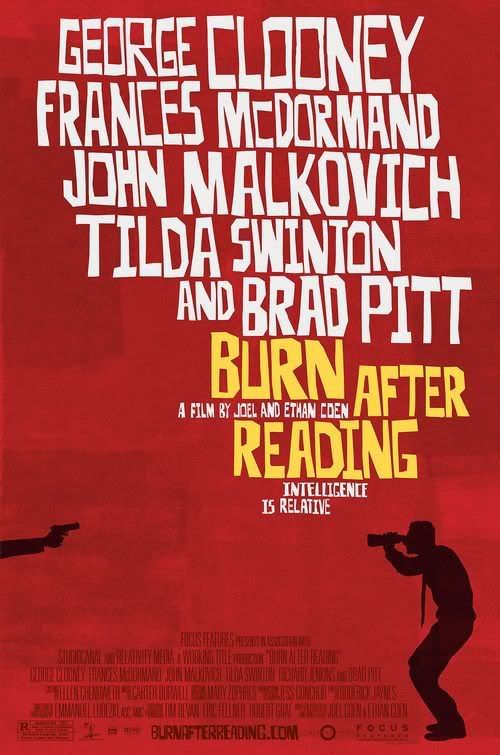
It only took twenty years, and about a dozen terrific pictures, but the Coen Brothers have finally got into the more public spotlight, and the wide release and rather large box office take (their largest to date) for "Burn After Reading" is strong evidence of that. Perhaps now their films won't be released into the obscure only to appear on DVD a few months after their release. But it's clear that even after winning the Oscar last year for "No Country for Old Men" that the Coens are not crossing the line into the mainstream, and "Burn After Reading" is vintage Coens from beginning to end-from their classic low camera angles, to their "man at the desk" trademark that seems to appear in every film that they've ever done.
Saturday, September 06, 2008
Mister Foe

I must admit I do not know much about Jamie Bell, a well received British actor who sparked interest when he appeared in 'Billy Elliot" in 2000. My only real exposure to him in a real leading role was in the Lars von Trier penned "Dear Wendy," a film I liked but did not have many comments regarding the young Bell. And now he appears in "Mister Foe," given a very depth-filled role in a very memorable little film. "Mister Foe" is a very gentle and well acted drama, which could have went a very different direction in terms of execution. Made in the United Kingdom, I have a feeling that had it been made in the United States, or in the hands of a more incompetent director, "Mister Foe" could have gone a more quirky and generic indie route. The eccentricities of its main characters are treated in a very human and natural way, instead of using them for cheap laughs or unnecessary comedy. And this is done, not only through the very realistic screenplay, but also the natural performances by the entire cast.
Thursday, September 04, 2008
Traitor

"Traitor" is one of those good films that makes a quiet opening during an off-movie season (in this case, one of the last few days of August). And it performs decently at the box office, before disappearing out of the theaters and then popping up a few months later on DVD. It's a sad fact that films like "Traitor" appear as counter programming to garbage films that young audiences would eat up (in this case, "Babylon A.D." or "Disaster Movie,") but this is why film critics enjoy their jobs-because from time to time they will be saved from trash with something worthy like this one. I am assuming that "Traitor" is trying to go down a similar path as "The Constant Gardener," which managed to find an audience after being released on the final day of August three years ago. And based on its first weekend box office, it might not do as bad as I had assumed.
Monday, September 01, 2008
Hamlet 2
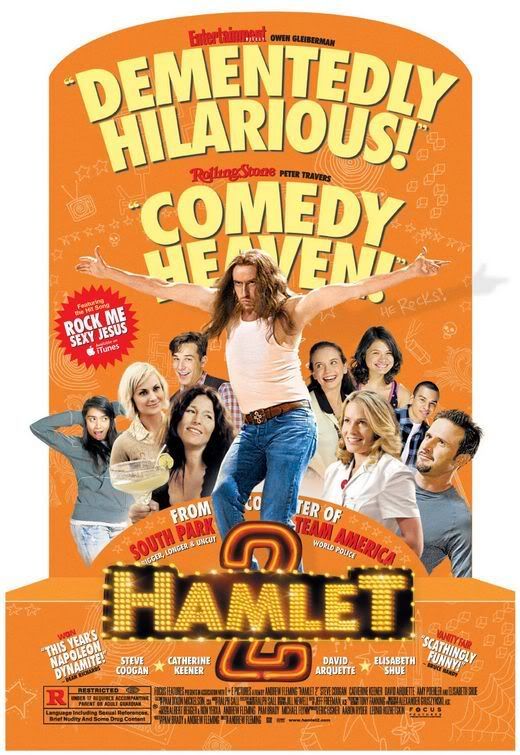
When I first read an article about "Hamlet 2" back in January when it premiered at the Sundance Film Festival I was instantly attracted to its title. A musical sequel to Hamlet? What fun! And then I read that Steve Coogan was the star, a British actor that I have enjoyed for a few years ever since I saw his short with Alfred Molina in "Coffee and Cigarettes." Both of these forces merged to form some kind of anticipation from me. Sadly "Hamlet 2" was not the comedy masterpiece that I had hoped for, but it is certainly an entertaining film, and a nice ending for the summer movie season. It also completes the quartet of R-rated comedies of "Step Brothers," "Pineapple Express," and "Tropic Thunder." I'm a bit pleased with Focus Features for giving it a moderately wide release (and failing, sadly), as it might give Coogan some kind of notice in America along with his memorably explosive appearance in "Tropic Thunder."
Tuesday, August 26, 2008
Momma's Man
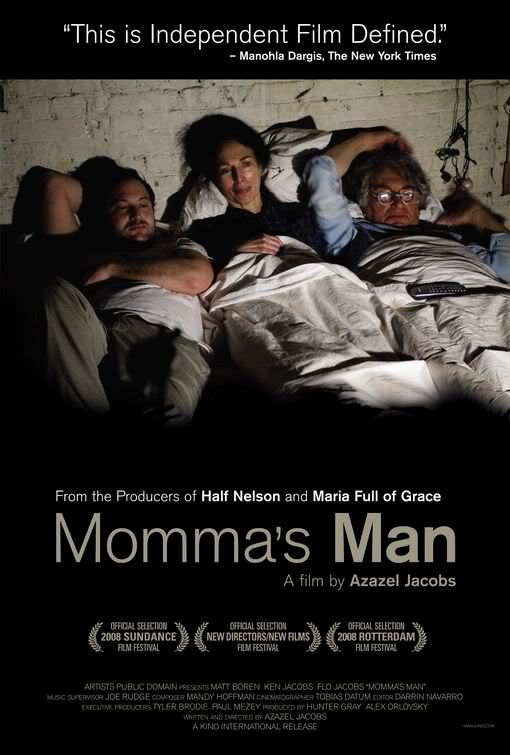
"Momma's Man" is a realist "slice of life" film that I could not seem to care about or even want to. Celebrated for its very realistic portrait of family life, I found it overlong, underwritten, and it moves at a plodding and maddeningly slow pace. It features a lead performance by Matt Boren, who is on the screen for ninety five percent of the five, often times not even speaking a word. But if his Mikey was an interesting character, or had a look on his face aside from the rather clueless and lazy one that he has for the entire movie, I might have been able to find something interesting in the work.
Wednesday, August 20, 2008
Henry Poole Is Here
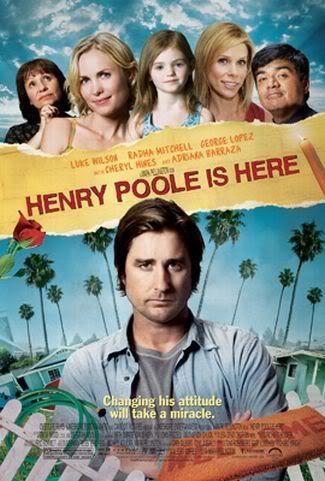
In order to get something out of "Henry Poole Is Here," one would be forced to have a certain suspension of belief. After all, this is a film all about the power to belief-to belief in faith, miracles, and even God. Unlike other "faith" based films-such as last year's awful "The Ultimate Gift"-"Henry Poole Is Here" does not try to jam down a message of God down the audiences throat, which makes it possible for people of all different beliefs to be touched by it. That choice by the screenwriter, as well as the very humanistic performances by the entire cast, made this film extremely touching, and a very rewarding experience for me.
The first time we meet Henry Poole (Luke Wilson) he is clearly in bad shape. Unshaven and sporting worn out and untucked button down shirts, Henry buys a rather beat up house in the neighborhood he grew up in, and decides to spend his days wallowing and drinking bottle after bottle of vodka. Henry was recently informed by his doctor that he has a terminal illness, and all he wants is to be left alone. However, he is instantly bothered by his neighbor Esperanza (Adriana Barraza), who believes that the face of God is on Henry's wall. Henry just thinks that it is a watermark left over by a bad stucco job. However Esperanza spreads the news and soon enough there is a line of people gathered outside of Henry's house trying to get a look at the face of Christ. Meanwhile, Henry gets involved with Dawn (Radha Mitchell), the single mother next door whose daughter Millie is mostly silent. Its with Dawn's help that Henry is able to believe in life again.
RIght off the bat, Luke Wilson is excellent here. After a large bunch of silly and lazy roles like in "My Super Ex-Girlfriend," "Mini's First Time," and "You Kill Me," he is finally given a real depth filled character to sink his teeth into. Clearly depressed, Wilson is able to do quite a bit with his appearance, and his eyes are so filled with hurt, pain, and fear throughout. He is aided by Adriana Barraza, who is given a nice balance of emotion and comedy much different from her riveting role in "Babel." Radha Mitchell's performance as Dawn was also quite satisfying, despite the fact that her love story subject with Henry was an easy route for the screenplay to go.
I am also somewhat crazy about several of director Mark Pellington's choices behind the camera, especially in the films first half. Pellington does something with sound and atmosphere in these opening scenes that I have a hard time explaining. I felt the same way about moments in Ridley Scott's masterpiece "Matchstick Men," where there is some trance like moments involving background sounds-such as a train whistle, or a wind chime. They really come together to form a look into Henry's very damaged and angry mind. The music score by John Frizzell is quite wonderful to, with a very nice mixture of quirky and beautiful, reminding me a little bit of something Thomas Newman would do.
However some choices in the second half of the film I must admit I was not crazy about. I suppose it was the love story between Henry and Dawn which, while sweet, just seemed a bit obvious and not the way I wanted the story to go. It leads to a somewhat over long movie, where Pellington has several music video type montages with Henry running, or Henry watching the sunset, or Henry playing with Millie, which padded the running time. However Wilson is able to stand firm and in character, and all of the actors really continued to bring me back to reality.
As I said, it is important to suspend belief in the movie, which ends up being quite easy as all these actors make it very easy to believe what is happening here. The screenplay really handles belief and faith in a very gentle way, never having the viewer feel superior to those that fall for the face in Henry's wall. And I found it very clever having the image on the wall seem stronger and stronger as the film moved forward-during its first appearance it barely resembles a face compared to what it looks like in the films climatic moments. This a film that does have the power to move, and I think it can move even the strictest atheist. Simply because it does not focus on a belief in God, but just a belief in life and love, and in not giving up whenever things seem rough. It's quite uplifting in a month of somewhat cynical and mean spirited films.
*** of ****
Saturday, August 09, 2008
Bottle Shock
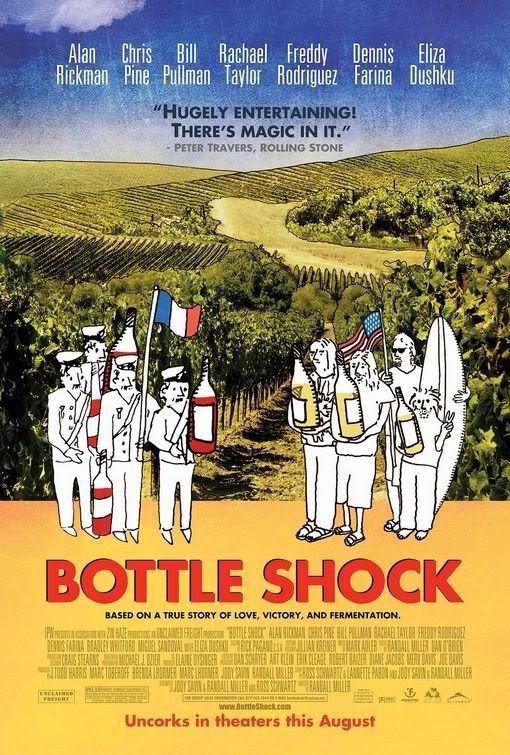
"Bottle Shock" is the new film by Randall Miller, a director whose work I've admired over the last two years. With three films under his belt, I first noticed him in 2006 with "Marilyn Hotchkiss' Ballroom Dancing and Charm School," a sometimes overly sapping romantic comedy, but one directed quite well and with some beautifully dark cinematography. The same went for his second film "Nobel Son," which I saw at the Tribeca Film Festival last year and is being released in October. Done with a very different tone and feel from his first film, it was still quite noticeable what talent that Miller had. Shot around the same time as "Nobel Son" and gathering quite a number of actors from that film, Miller made "Bottle Shock," a unsurprisingly entertaining historical piece with Alan Rickman giving a terrific lead performance as wine snob Steven Spurrier, who in 1976 shattered the myth that the French have the most superior wine in all the world. Not since the 2004 masterpiece "Sideways" have I seen such an wonderful film about wine. While "Bottle Shock" may not be as perfect as "Sideways," it certainly does have more information about the craze of wine, and the passion behind blind wine tastings.
Thursday, July 31, 2008
Films to Looks for in NYC
Sunday, July 27, 2008
Pineapple Express
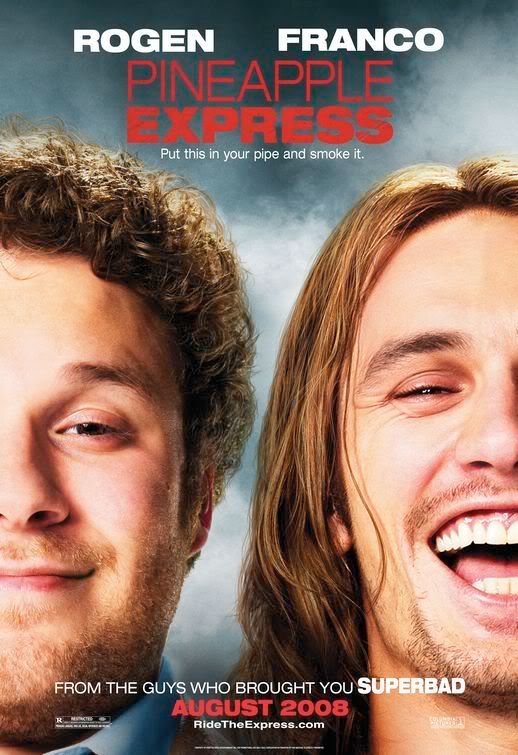
Sunday, July 20, 2008
The Dark Knight
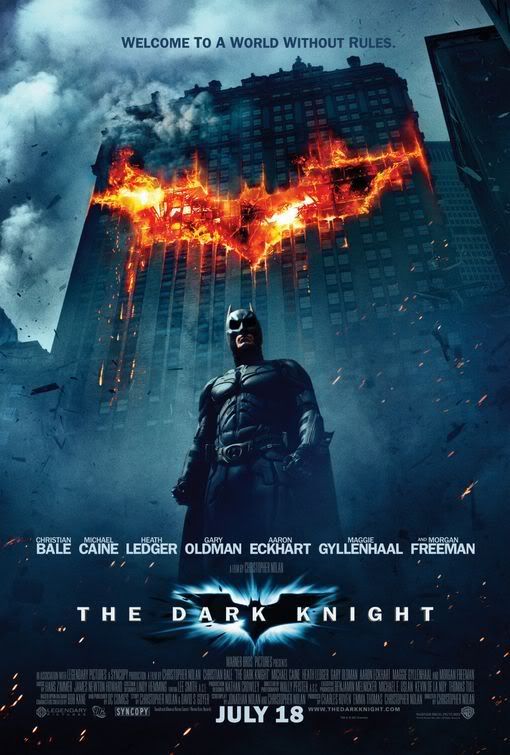
I really did not have many expectations for "The Dark Knight," despite finding the trailer somewhat good. I honestly was not a fan of "Batman Begins," even though there was so much love and affection for it, with critics and Batman fans alike both proclaiming it the Batman movie to end all Batman movies. Rewatching it in preparation for "The Dark Knight" still had me wondering what the big deal was. After seeing this sequel, I have put more faith in Christopher Nolan's "Batman" vision, and he somehow magically fixed all of the problems that I had with his first film. "The Dark Knight" is an excellent super-hero movie, which works beyond the realm of the super-hero genre and into the realm of a great crime film. There are not many large set pieces in this film, and Batman only appears for a small handful of time, but its the drama that elevates this film-much like the drama elevated "Spider-Man 2," only this is bigger and better and almost flawless in execution.
Wednesday, July 16, 2008
The Stone Angel
Starting in the present, we meet Hagar Currie on her way to tour an assisted living facility with her son Marvin (Dylan Baker) and his wife Doris. From her very first line ("I have to go to the bathroom!") one can tell the fierce independence that she has, just in Burstyn's delivery. It's revealed in these early scenes that she is somewhat unstable, suffers fainting spells, and is often forgetful, but she resists going to the home. Through flashbacks a la last year's "Evening" (a film that I can easily compare this one too), we get a sense of who she was and is, showing us her separation from her father when she decides to marry Bram Shipley (Cole Hauser). Her father would rather her continue the family business of running a store. We see her relationships with her two sons-Marvin and John-and as she gets on in the years we see her make many mistakes, not even getting it fully right when she is close to death, making her more human than any movie character you'll see all year.
Burstyn is extremely good in this film, and this is her most mature role in a while (fresh off of "The Wicker Man" from two years ago). But the real soul of the film comes from young Christine Horne, who plays the young Hagar, does not only resemble and act like Burstyn would, but also acts with such experience that its hard to believe this was her first major role. A supporting role by character actor Dylan Baker is also very welcome-Baker is one those actors who appears in and out of many movies and whose name never sticks, but in one week he showed much range for me, making me laugh hard in 'Diminished Capacity" and almost breaking my heart here. And Ellen Page, however brief her performance, is good in the last performance from her pre-"Juno" burst of fame. Playing at interesting parellel to the Hagar character, Page's Arlene is a chance for Hagar to stop someone else from making the same mistakes that she did. Page does a good job at resisting Hagar's advice, just as Hagar did when everyone tried to advise her. Comparing this more human performance to "Juno," or even the film she made after that "Smart People," I personally think that "Juno" might have been the worst thing for her in terms of future typecast. Similar to Jon Heder never breaking the "Napolean Dynamite" image.
It really ends up being the acting that makes "The Stone Angel" easy to recommend. At times the screenplay does get a bit convoluted in terms of drama-eventually so much stuff happens to these characters that it got tedious and even a bit unbelievable, but thankfully the performances played it well enough where it did not become overbearing. And the only example I can possibly think of, a moment of real true beauty here, comes towards the end of the film. Hagar (in this case played by Burstyn) goes to see Bram after many many years of separation. We see what he has become-a sad and lonely drunk who needs whiskey instead of medicine-and the two of them share a look. A simple glance, that is acted so well where we can see their histories and their love and her ability to never give up on him, that almost brought a tear in my eye. Sadly the whole film couldn't deliver that kind of simple beauty, but its the moments like those, played so effortlessly by masters young and old, that made "The Stone Angel" worthwhile.
Final Rating:
*** of ****
Monday, July 07, 2008
Kabluey
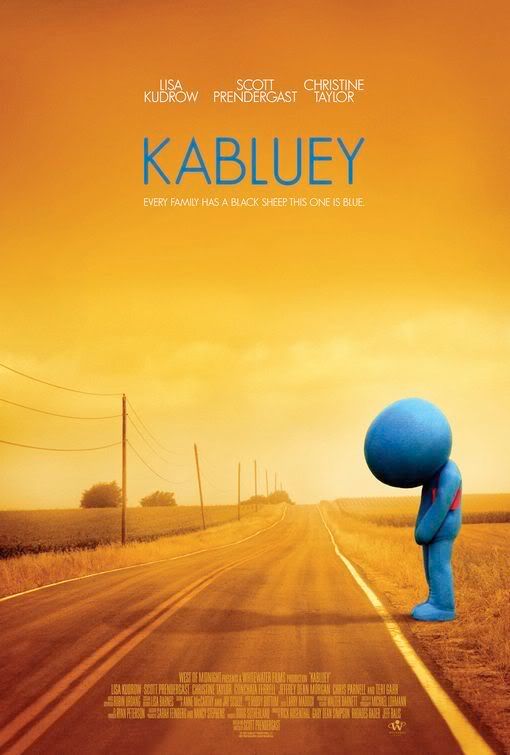
Scott Prendergast's "Kabluey" is one of those little movies that warm the heart when they get a theatrical release, and when that theatrical release actually gets some revenue, however moderate. It's also the first bone budget indie film I've seen in a while that thankfully doesn't involve some kind of coming of age road trip-which is somewhat ironic as the center piece of the film involves a road. "Kabluey" is a short, sweet, and ultimately quite hilarious little movie, which is smart enough to avoid a political message that would weigh haved weighed it down even though the device that sets in motion the entire plot.
Lisa Kudrow stars as Leslie Miniver (perhaps a sly reference to the war torn family in "Mrs. Miniver," but that could be reading into it more than it should be), whose husband Noah (never seen except in pictures where he constantly has this snarl on his face) has been sent to Iraq for his tour of duty. Left at home with her two screaming and misbehaved children Cameron and Lincoln, Leslie is in desperate need to help. Her mother in law than comes up with the idea of sending her son Salman (played by director/writer Prendergast) to babysit for a while. Salman is down on his luck in every way possible, to the point where he tries to sell his car for two hundred dollars just to try and get a few meals. He does come willingly, and after a few days of being tortured, is given a job at Leslie's company BluNexon. Hurt in a stock market crash, the company is in a large building with a lot of office space, and Salman's job is to stand on the side of a highway road passing out fliers to rent the office space. The only catch is that he has to wear a large blue suit-the emblem of the company that isn't really much of anything-just a large blue blob.
"Kabluey" is very thin on plot, which ends up being a positive more than a negative., despite getting minorly tedious towards the end. It's less of a plot than just a bunch of short sketches, tied together by a loose story. The furtherest it goes is giving Leslie an affair with her boss, which Salman tries to stop quickly to defend his brother. But Prendergast does have a gift for offbeat physical comedy. Researching him after seeing the film, I only recognized one title. A four minute short film that he did a few years ago called "Anna Is Being Stalked," which I remember seeing on the IFC Channel during a shorts presentation. That short you can find online through google, and I'm pleased that he was successful with his first feature. The blue suit, which could have been only used for comedy because of the way it looks, is made much funnier by what he does inside of the suit-which include having to stick his hand out of the rear to get food and drink inside as the suit doesn't have a place for his hands.
The material here is sometimes overly quirky, a problem that I have with several independent movies, and I'm sure some of the material must have looked odd on the page. But its the performers that really elevate the material quite a bit, giving it the humanity and the realism that this sometimes extreme quirk really needs. I was mainly impressed with Lisa Kudrow, and this is her best post-"Friends" work since "Happy Endings," (although she hasn't really been given many parts, unless you want to include "Marci X.") There is also fun supporting work by character actress Conchata Ferrell and Teri Garr. The latter does her second performance in under a month (the other being "Expired) and in both cases she is given a character that deserves more time because of how well Garr plays it. Here, Garr plays a woman who screams in anger and terror every time she sees Salman in the suit because she lost her life savings when the company crashed. Not much is really done with her character, and the screenplay wraps her character up after an encounter in a grocery store. The flawed screenplay does this several times-introducing some very good ideas and than dropping them in favor of a very brisk 80 minute running time. In one segment, Salman gets a job in the suit at a kid's birthday party, and eavesdrops on the other guest who just ignore his presence not deeming him a threat. And the viewer only gets a single joke out of that which doesn't even end up being as funny as it should have been.
Despite its flaws, "Kabluey" ends up being a very effective little comedy, which is blessed with several memorable performances. Even side characters are given enough to care about, and they deliver some truly hilarious moments. I wish some of the material could have been fleshed out a bit more, but for a feature debut Scott Presdergast really does offer up hope for a follow up.
*** of ****
Thursday, July 03, 2008
Finding Amanda
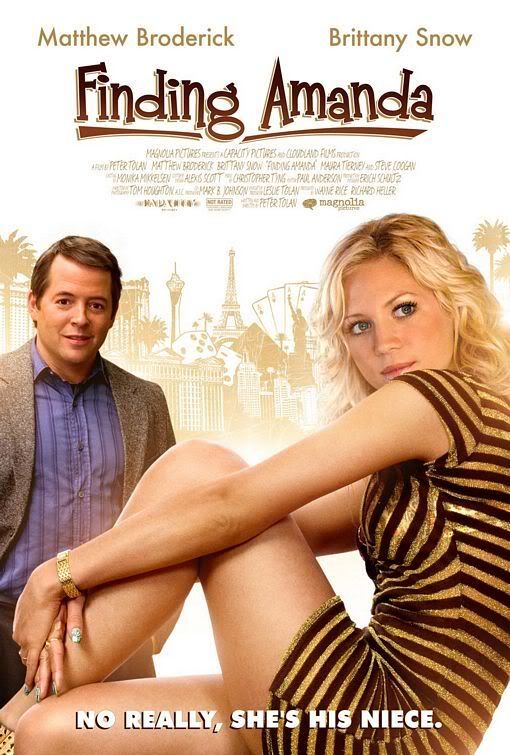
"Finding Amanda" is a dark comedy about gambling, drinking, strippers, hookers-you name it. Really bottom of the barrel stuff in terms of dark humor. And yet there wasn't a single moment throughout its rather smart screenplay-filled with some four letter words and few sexually explicit conversations-where I felt dirty watching it, or felt like it was dirty for the sake of being dirty, or it was trying to cross a line to be edgy. Everything really seemed in place and earned in a way, enough for the third act to be fittingly poignant and even somewhat sweet. Matthew Broderick is one of those actors-much like John Cusack-who the audience just has a tendency to want to root for him and want him to win. Take Cusack in "The Ice Harvest," a film where he lies and cheats and steals, and yet in the end he still looks like a good guy. The same goes for Broderick's Taylor Peters, a TV writer who is finally getting his recognition back on a somewhat low rated sitcom starring Ed Begley Jr. Taylor had a few rough years where he was addicted to drugs and booze, but is starting to get on his feet with the help of his wife Lorraine (played by Maurs Tierny.) However Taylor can't seem to stop gambling, and will easily throw a few thousand dollars at the track.
